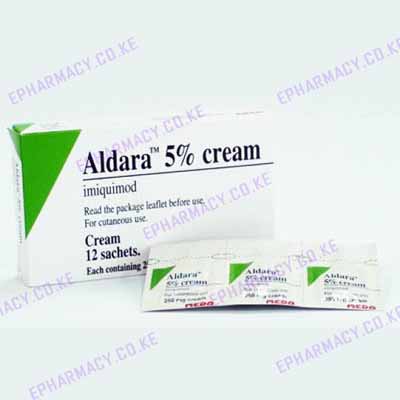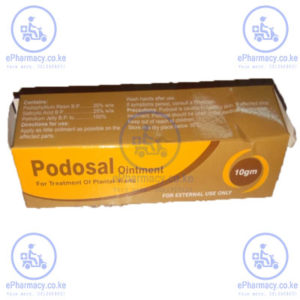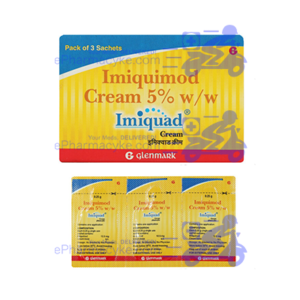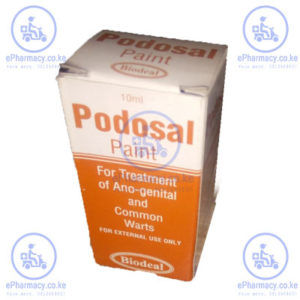Description
What is Aldara cream used for in Kenya?
- External genital warts and warts around the anus.
- Small superficial skin cancers (basal cell carcinomas).
- Rough areas of skin caused by sun damage (actinic keratoses). The cream is used for non-raised lesions on the face or scalp, in people with a healthy immune system when other treatments are not appropriate.
How does Aldara work?
Aldara cream contains the active ingredient imiquimod, which is a type of medicine called an immunomodulator. It is used to treat three different skin conditions in Kenya: genital warts, small superficial skin cancers and actinic keratoses.
Imiquimod acts by stimulating the body’s own defence mechanisms. It is thought that it works by binding to immune cells in the skin, causing them to release natural defence chemicals called cytokines. One such cytokine is called alpha interferon.
Alpha interferon and other cytokines have many functions in the immune system. They help fight viral infections by preventing viruses from multiplying in cells. They also prevent abnormal or malignant cells from increasing in numbers.
Genital warts are caused by the human papilloma virus (HPV). Aldara cream stimulates the immune cells in the skin to attack the virus, which cures the warts.
Superficial (non-malignant) skin cancers called basal cell carcinomas occur when certain skin cells multiply in an abnormal and uncontrolled way. This cream stimulates the body to attack the abnormal cells, which shrinks the cancerous growth.
Actinic keratoses are rough areas of skin caused by sun damage over many years, eg from sunbathing or using sunbeds, or working outdoors. They occur in fair-skinned people – hence not very common in Kenya – whose skin is particularly sensitive to the damaging effect of UV rays. The skin lesions are usually harmless, however about two percent will turn into a skin cancer (squamous cell carcinoma). Some small actinic keratoses may disappear on their own. However, the chance of an actinic keratosis turning into a skin cancer falls if the actinic keratosis is treated early. This cream stimulates the body to attack the abnormal or damaged skin cells.
How do I use Aldara imiquimod 5% cream?
- It is important to follow the instructions given by your doctor, as well as those printed in the information leaflet supplied with the cream. See also the warning section below.
- For warts on the genitals and around the anus, the cream should be applied in a thin layer to the warts and rubbed in until it vanishes, three times a week (for example monday, wednesday, friday) before going to bed. Do not apply the cream to warts that are inside the anus or vagina. The cream should be left on for 6 to 10 hours each time and then washed off with mild soap and water. The treatment is continued until the warts are cleared (up to a maximum of 16 weeks per episode of warts).
- For basal cell carcinomas, sufficient cream should be applied to cover the treatment area, including one centimetre of skin surrounding the tumour, and rubbed in until it vanishes five times a week (for example monday to friday) before going to bed. The cream should be left on for 8 hours each time and then washed off with mild soap and water. The treatment is continued for 6 weeks. 12 weeks after the treatment is finished your doctor will reassess the cancer. If it has not fully responded a different treatment will be used.
- For actinic keratoses, sufficient cream should be applied to cover the treatment area, and rubbed in until it vanishes three times a week (for example monday, wednesday, friday) before going to bed. The cream should be left on for 8 hours each time and then washed off with mild soap and water. The treatment is continued for 4 weeks and you then have a 4 week treatment-free period before your doctor reassesses your skin. If any actinic keratoses remain you will be prescribed one more 4 week course of treatment. Each treatment period should not last for longer than 4 weeks, even if you have had missed doses or rest periods in those 4 weeks.
Warning and Side Effects About Using Aldara!
- Carefully follow the instructions provided with this medicine.
- Do not re-use a sachet once you have opened it.
- This cream is for external use only and must not be taken by mouth.
- Avoid getting the cream in contact with the eyes, lips and nostrils.
- Avoid use on broken or inflamed skin.
- Avoid use on normal healthy skin.
- Do not cover the treated area with dressings.
- Wash your hands and the area of skin you are going to treat with mild soap and water and dry thoroughly before applying the cream. Wash your hands again after applying the cream.
- After you have applied the cream, showering or bathing should be avoided until it is time to wash the cream off. It is ESSENTIAL that you remember to remove the cream with mild soap and water after the treatment time is up. Application of an excessive amount of cream, or prolonged contact with the skin may result in a severe application site reaction.
- If you miss a dose, apply the cream as soon as you remember and then continue with your regular schedule. However, do not apply the cream more than once in any day.
- If you get a severe skin reaction that causes you discomfort after using the cream, you should remove the cream by washing the area with mild soap and water. On rare occasions, skin reactions may be accompanied by flu-like symptoms such as fever, nausea or aches and pains. If necessary, you can take a rest period of several days before starting the treatment again.
- If you get an infection at the application site you should consult your doctor so that this can be treated. If necessary, you can take a rest period of several days before starting Aldara treatment again.
- Uncircumcised men treating warts under the foreskin should pull back the foreskin and wash the area daily. This is to avoid constriction of the foreskin (phimosis). If you have any trouble pulling back your foreskin during treatment, or you get skin reactions such as redness, ulceration or hardening of the skin, you should stop using this cream and consult your doctor.
- The cream should be washed off before any sexual contact.
- This cream may damage latex condoms and diaphragms, which could make them less effective at preventing pregnancy and sexually transmitted infections. You should use an alternative method of contraception while you are using this cream.
- This cream may not be fully effective at clearing genital warts in people who are HIV positive.
- People treating basal cell carcinoma or actinic keratoses should protect the area being treated from exposure to sunlight by wearing protective clothing and a wide brimmed hat when outdoors. Do not use sunbeds or sunlamps.
- While you are using this cream and until the skin has healed, the area treated is likely to look noticeably different to your normal healthy skin.
Use with caution in
- People with inflammatory skin conditions.
- People with autoimmune conditions (where the immune system attacks the body’s own tissues) such as systemic lupus erythematosus.
- People who have had an organ transplant.
- People who are taking immunosupressant medicines.
- People who have a weakened immune system.
- People with low levels of one or more types of blood cells in the blood.
- Uncircumcised men with warts on or under the foreskin (see warning above).
Not to be used in
- Children and adolescents under 18 years of age.
- Warts inside the genitals (urethra, vagina or cervix) or anus.
This medicine should not be used if you are allergic to one or any of its ingredients. Please inform your doctor or pharmacist if you have previously experienced such an allergy.
If you feel you have experienced an allergic reaction, stop using this medicine and inform your doctor or pharmacist immediately.
Can I Use Aldara if I am Pregnant or Breastfeeding?
Certain medicines should not be used during pregnancy or breastfeeding. However, other medicines may be safely used in pregnancy or breastfeeding providing the benefits to the mother outweigh the risks to the unborn baby. Always inform your doctor if you are pregnant or planning a pregnancy, before using any medicine.
- The safety of this medicine for use in pregnant women has not been established. It should be used with caution during pregnancy, and only if the expected benefit to the mother is greater than any possible risk to the developing baby. Seek medical advice from your doctor.
- This medicine is unlikely to pass into breast milk after application to the skin. However, the manufacturer does not state whether or not it can be used by women who are breastfeeding. Seek medical advice from your doctor.
Known Side effects of Aldara Imiquimod Cream in Kenya
Medicines and their possible side effects can affect individual people in different ways. The following are some of the side effects that are known to be associated with this medicine. Just because a side effect is stated here, it does not mean that all people using this medicine will experience that or any side effect.
- Itching, irritation, pain or burning at application site.
- Redness and inflammation of skin at application site.
- Erosion, flaking or swelling of the skin at the application site.
- Scabbing and crusting of skin at application site.
- Tingling sensations at the application site.
- Ulceration at site of application.
- Hair loss around the application site.
- Increase or decrease in skin pigmentation at application site – this may be permanent.
- Headache.
- Flu-like symptoms.
- Aching muscles or joints.
- Infections.
- Swollen glands.
- Nausea.
- Difficulty or pain urinating in women treated for genital warts.
The side effects listed above may not include all of the side effects reported by the medicine’s manufacturer.
For more information about any other possible risks associated with this medicine, please read the information provided with the medicine or consult your doctor or pharmacist.
How can the use of Aldara affect other medicines?
This Imiquimod cream available online in Kenya has not been studied in combination with other medicines. It is only absorbed through the skin into the bloodstream in very small amounts, so any effect on other medicines is likely to be insignificant.
However, as it stimulates the immune system, the manufacturer states that it should be used with caution in people who are taking medicines to suppress the immune system (IMMUNOSUPPRESSANTS), for example following an organ transplant, or to treat an autoimmune disease, because there is the possibility that it could make these medicines less effective.
Where Can I Buy Aldara Cream In Kenya?
Aldara cream is available in a number of Chemists and Pharmacy outlets near you. If you cannot manage to find and purchase one near, you can buy it online in Kenya through ePharmacy Kenya’s Online Chemist Portal.
How Much is Aldara Cream in Nairobi? Price of Aldara in Kenya
A pack of 12 sachets sells for Ksh7500, still you can buy a single sachet online at Ksh625
Do I Need a Prescription to Buy Aldara Cream in Kenya?
No. Aldara Cream can be procured online in Kenya without a prescription. Nevertheless, you will need proper guidance on how to use it from a qualified dermatologist, pharmacist, nurse, doctor or consultant.
(Info as published on netdoctor.co.uk)





Reviews
There are no reviews yet.